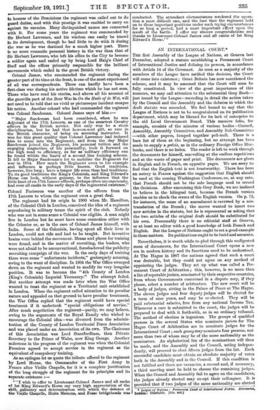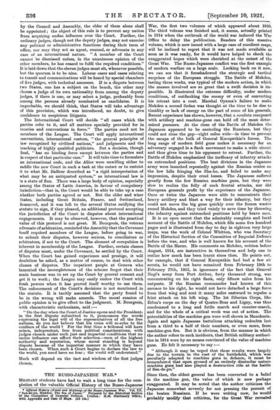AN INTERNATIONAL COURT.*
TEEM first Assembly of the League of Nations, at Geneva last December, adopted a statute establishing a Permanent Court of International Justice and defining its powers, in accordance with Article 14 of the Covenant. As soon as a majority of tho members of the League have ratified this decision, the Court will come into existence ; Groat Britain has now sanctioned the scheme, and it may be assumed that the Court will soon bo fully constituted. In view of the great importance of this measure, we may call attention to the substantial Grey Book— just issued by the League—recording in detail the action taken by the Council and the Assembly and the debates in which the draft statute was amended. We feel bound to say that the League of Nations is not to be congratulated on its publication department, which may be likened for its lack of enterprise to the old Local Government Board. This massive folio, for example, consists of the minutes of various bodies—Council, Assembly, Assembly Committee, and Assembly Sub-Committee with other papers, lumped together pell-mell. There is a bare list of them at the beginning, but no attempt has been made to supply a précis, as in the ordinary Foreign Office Blue- books, and there is no index. The reader is left to work through the documents for himself, marvelling at the endless repetitions and at the waste of paper and print. The documents are given in English and in French, on opposite pages. We are sorry to find that the English text is not trustworthy. There has been an outcry in France against the suggestion that English should be used at the coming Washington Conference, or, at any rate, that French should not be the sole language used to record the decisions. After examining this Grey Book, we aro inclined to believe in the bilingual text, because the French version enables us to check the errors of the English version. On p. 73, for instance, the sense of an amendment is reversed by a mis- translation of the French ; the mover wanted to insert two new articles in the statute, but he is represented as asking that the two articles of the original draft should be substituted for his own. Presumably there is no editorial staff at Geneva, or at least no editor with a good knowledge of both French and English. But the League of Nations ought to set a good example in these matters. Its publications ought to be lucid and accurate.
Nevertheless, it is worth while to plod through this undigested mass of documents, for the International Court opens a new era in modern history and its functions need to be understood. At The Hague in 1907 the nations agreed that such a court was desirable, but they could not agree on any method of appointing the judges. They set up what was called a Per- manent Court of Arbitration ; this, however, is no more than a list of reputable jurists, nominated by their respective countries, from whom Governments concerned in a dispute may, if they please, select a number of arbitrators. The new court will bo a body of judges, sitting in the Palace of Peace at The Hague. The eleven judges and four deputy judges will be elected for a term of nine years, and may be re-elected. They will be paid substantial salaries, free from any national Income Tax. Whenever a case is submitted to the court, the judges will be prepared to deal with it forthwith, as in an ordinary tribunal. The method of election is ingenious. The groups of qualified persons in the several States who nominate jurists for The Hague Court of Arbitration are to nominate judges for the International Court ; each group may nominate four persons, not more than two of whom may be of the same nationality as the nominators. An alphabetical list of the nominations will then be made, and the Assembly and the Council, acting indepen- dently, will proceed to elect fifteen judges from the list. Each successful candidate must obtain an absolute majority of votes both in the Assembly and in the Council. If this condition is not fulfilled and there are vacancies, a second and, if necessary, a. third meeting must be held to choose the remaining judges. When the Council and Assembly fail to agree on the candidates, the judges already elected may co-opt their colleagues. It is provided that if two judges of the same nationality are elected • League of Nations : Permanent Court of Internattonal Judie.. Documents, Loudon t Constable. 05s. -net] by the Council and Assembly, the elder of them alone shall be appointed ; the object of this rule is to prevent any nation from acquiring undue influence over the Court. Further, the ordinary judges, though not the deputy judges, may not exercise any political or administrative functions during their term of
office, nor may they act as agent, counsel, or advocate in any case of an international nature. " A member of the Court cannot be dismissed unless, in the unanimous opinion of the other members, he has ceased to fulfil the required conditions." It is laid down that the eleven judges must sit, whenever possible, but the quorum is to be nine. Labour cases and oases relating to transit and communications will be heard by special chambers of five judges, with technical assessors. If in a dispute between two States, one has a subject on the bench, the other may choose a judge of its own nationality from among the deputy judges, if there is one, or may select a judge, preferably from among the persons already nominated as candidates. It is improbable, we should think, that States will take advantage of this provision, which was introduced, no doubt, to give confidence to suspicious litigants.
The International Court will decide " all cases which the parties refer to it, and all matters specially provided for in treaties and conventions in force." The parties need not be members of the League. The Court will apply international conventions, international custom, " the general principles of law recognized by civilized nations," and judgments and the teaching of highly qualified publicists. But a decision, though final, " has no binding force except between the parties and
In respect of that particular case." It will take time to formulate In international code, and the Allies were unwilling either to saddle the new Court in such a task at the outset or to restrict It to what Mr. Balfour described as " a rigid interpretation of what may be an antiquated system," as international law is :n a state of flux. There was a large body of opinion, especially
among the States of Latin America, in favour of compulsory lurisdiction—that is, the Court would be able to take up a case whether both parties agreed or not. But the older and wiser states, including Great Britain, France, and Switzerland, lemurred, and it was left to the several States ratifying the statute to sign, if they pleased, an additional protocol accepting the jurisdiction of the Court in disputes about international engagements. It may be observed, however, that the practical value of this protocol is not great. M. Bourgeois, the veteran advocate of arbitration, reminded the Assembly that the Covenant itself required members of the League, before going to war, to submit their disputes, however serious, to conciliators or arbitrators, if not to the Court. The element of compulsion is inherent in membership of the League. Further, certain classes of disputes must, under the Covenant, be settled by the Court.
When the Court has gained experience and prestige, it will doubtless be asked, as a matter of course, to deal with other classes of disputes. The impatient people at Geneva who lamented the incompleteness of the scheme forgot that their main business was to set up the Court by general consent and get it to work ; the League may easily endow the Court with fresh powers when it has proved itself worthy to use them. The enforcement of the Court's decisions is not mentioned in the statute. It is tacitly assumed that the party found to be in the wrong will make amends. The moral suasion of public opinion is to give effect to the judgment. M. Bourgeois, with characteristic enthusiasm, said :-
" On the day when the Court of Justice opens and the President, in the first dispute submitted to it, pronounces the words expressing the legal will of the representatives of all the free nations, do you not believe that his voice will re-echo to the confines of the world Y For the first time a tribunal will have arisen, independent, free from political considerations, with judges chosen under such just and impartial conditions that no undue influence can affect their selection—men of the highest authority and reputation, whose moral standing is beyond dispute because of the impartial manner in which they have been chosen. When such a Court begins to declare the law to the world, you need have no fear ; the world will understand."
Much will depend on the tact and wisdom of the first judges chosen.



































 Previous page
Previous page